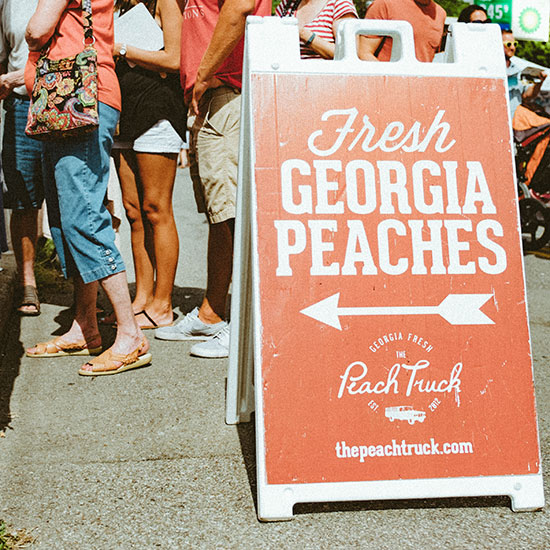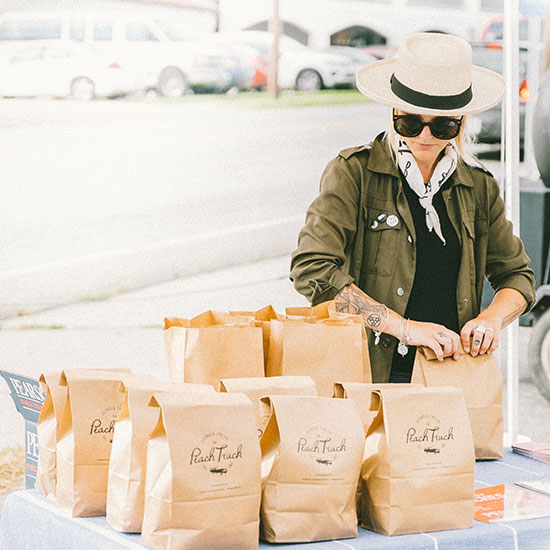Final Call for Peaches! Here’s One Way to Get Your Fill
With stone fruit in demand this season, Nashville’s The Peach Truck steps up to the plate.
Final Call for Peaches! Here’s One Way to Get Your Fill
With stone fruit in demand this season, Nashville’s The Peach Truck steps up to the plate.

The husband-wife duo – and team behind Nashville’s wildly popular The Peach Truck – has been transporting peaches all over the South for five years. But the couple stepped up their game in 2013 with the Farm to Porch program, which allows residents of 46 states (excluding Alaska, Arizona, California, and Hawaii) to order a box of Georgia’s finest and have it delivered straight to their stoop. “I love that we can help folks get through a peach-less summer,” Stephen says.
Since launching as a grassroots effort in 2012 and partnering with the family-owned Pearson Farm in Stephen’s hometown of Fort Valley, Georgia, the Roses have become one of Nashville’s most successful food enterprises. To share peaches with the masses, they haul their colorful bounty up to Music City in the bed of an 1964 Jeep pick-up truck.
“It was a super simple vision from the start: I wanted to eat great peaches, and I was sure other people would like them, as well,” Stephen says. “We went over to [clothing store] Imogene + Willie and asked if we could park in front of their shop. They loved the idea, and we started nights and weekends selling peaches out of the back of the truck.”
Since those humble beginnings, the Roses now employ 50 seasonal workers who distribute the fruit at various stands around Middle Tennessee and dole them out to the patient patrons lining up on each stop of The Peach Truck’s annual Freestone Tour – which also visits Kentucky, Pennsylvania, Ohio, and Indiana.
The concept of simplistic roadside stands came about through the Roses’ extensive travels abroad through India. “There are roadside fruit vendors everywhere there,” Stephen says. “It’s one of the oldest businesses. And our simple, ‘let’s get peaches fresh off the tree to as many people as possible’ has really struck a chord with folks.”


So what’s so different about a Peach Truck product versus the one you might find on a grocery store shelf? On top of Pearson Farms’ impressive longevity in the farming world – they’ve been growing on the same land for five generations – Stephen says it’s all in the timing from when the peach leaves the tree until a customer takes a big, juicy bite.
“A lot of stores want a peach that has a long shelf life, so they ask the farmer to pick it before it’s ripe. We want a peach that’s ripe because we’re going to get it to the customer within a couple days,” he explains. “So they don’t have to pick peaches early; they’re able to pick the ripe peach, and they’re able to grow them in a way that peaches should be grown.”
Peaches are, as Jessica describes, a “very high maintenance” commodity. As such, the Roses take meticulous care with every piece of the stone fruit that’s plucked from its Georgia home and sent on its way across the country. “A peach cannot have any machines touch it, because they’ll just ruin it. It’s hundreds of people’s hands that do everything,” she says. “The thought and care that goes into it – every little thing matters.”
Jessica adds that every single peach that goes out over the course of the 13-week season (from May through August) has been carefully examined by her, Stephen, or their director of operations, Justin Rearden. “We talk about: Where has this been? What’s happening? How long has it been out? Has it been conditioned?” she says, referring to the ripening process. “Peaches can cause a lot of headaches. It feels good that we’re doing something really difficult.”
While this year’s 126-stop Freestone Tour ends this Saturday and won’t start up again until next June, The Peach Truck will continue to sell via its Nashville locations through August 7.
Follow us

This work is licensed under a Creative Commons Attribution-NoDerivatives 4.0 International License.
Want to republish a Modern Farmer story?
We are happy for Modern Farmer stories to be shared, and encourage you to republish our articles for your audience. When doing so, we ask that you follow these guidelines:
Please credit us and our writers
For the author byline, please use “Author Name, Modern Farmer.” At the top of our stories, if on the web, please include this text and link: “This story was originally published by Modern Farmer.”
Please make sure to include a link back to either our home page or the article URL.
At the bottom of the story, please include the following text:
“Modern Farmer is a nonprofit initiative dedicated to raising awareness and catalyzing action at the intersection of food, agriculture, and society. Read more at <link>Modern Farmer</link>.”
Use our widget
We’d like to be able to track our stories, so we ask that if you republish our content, you do so using our widget (located on the left hand side of the article). The HTML code has a built-in tracker that tells us the data and domain where the story was published, as well as view counts.
Check the image requirements
It’s your responsibility to confirm you're licensed to republish images in our articles. Some images, such as those from commercial providers, don't allow their images to be republished without permission or payment. Copyright terms are generally listed in the image caption and attribution. You are welcome to omit our images or substitute with your own. Charts and interactive graphics follow the same rules.
Don’t change too much. Or, ask us first.
Articles must be republished in their entirety. It’s okay to change references to time (“today” to “yesterday”) or location (“Iowa City, IA” to “here”). But please keep everything else the same.
If you feel strongly that a more material edit needs to be made, get in touch with us at [email protected]. We’re happy to discuss it with the original author, but we must have prior approval for changes before publication.
Special cases
Extracts. You may run the first few lines or paragraphs of the article and then say: “Read the full article at Modern Farmer” with a link back to the original article.
Quotes. You may quote authors provided you include a link back to the article URL.
Translations. These require writer approval. To inquire about translation of a Modern Farmer article, contact us at [email protected]
Signed consent / copyright release forms. These are not required, provided you are following these guidelines.
Print. Articles can be republished in print under these same rules, with the exception that you do not need to include the links.
Tag us
When sharing the story on social media, please tag us using the following: - Twitter (@ModFarm) - Facebook (@ModernFarmerMedia) - Instagram (@modfarm)
Use our content respectfully
Modern Farmer is a nonprofit and as such we share our content for free and in good faith in order to reach new audiences. Respectfully,
No selling ads against our stories. It’s okay to put our stories on pages with ads.
Don’t republish our material wholesale, or automatically; you need to select stories to be republished individually.
You have no rights to sell, license, syndicate, or otherwise represent yourself as the authorized owner of our material to any third parties. This means that you cannot actively publish or submit our work for syndication to third party platforms or apps like Apple News or Google News. We understand that publishers cannot fully control when certain third parties automatically summarize or crawl content from publishers’ own sites.
Keep in touch
We want to hear from you if you love Modern Farmer content, have a collaboration idea, or anything else to share. As a nonprofit outlet, we work in service of our community and are always open to comments, feedback, and ideas. Contact us at [email protected].by Kristin Luna, Modern Farmer
July 28, 2016
Modern Farmer Weekly
Solutions Hub
Innovations, ideas and inspiration. Actionable solutions for a resilient food system.
ExploreExplore other topics
Share With Us
We want to hear from Modern Farmer readers who have thoughtful commentary, actionable solutions, or helpful ideas to share.
SubmitNecessary cookies are absolutely essential for the website to function properly. This category only includes cookies that ensures basic functionalities and security features of the website. These cookies do not store any personal information.
Any cookies that may not be particularly necessary for the website to function and are used specifically to collect user personal data via analytics, ads, other embedded contents are termed as non-necessary cookies.